role play 小学教案
6-牛津版英语四年级升五年级暑期1对1讲义---role play
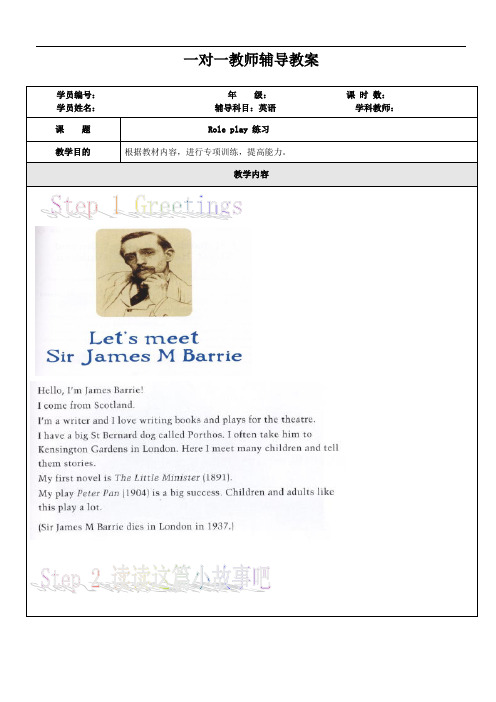
一对一教师辅导教案“南美洲”,类似美国不过是在南方。
我想要住的地方?天堂瀑布。
A land lost in time. I ripped this right out of a library book!rip: 撕library: 图书馆right out of: 从……带走即将消失的土地。
我从图书馆里的书撕下来。
I'm gonna move my club house there! And park it right next to the falls.gonna: <美俚>going to move: 搬park: 置于…我要把房子移到接近瀑布的地方…Who knows what lives up there! And once I get there...天知道还有谁住在上面……一旦我到那里后,I'm gonna save all these pages for all the adventures I'm gonna have.save: 保留page: 页adventure: 冒险我会把冒险的事情接在后面。
Only... I just don't know how I'm gonna get to Paradise Falls. That's it! You can take us there in a blimp! blimp: 小型飞船只是不晓得怎么到那里。
对了你可以用房子当飞船。
Swear you'll take us there! Cross your heart! Cross it! Cross your heart!发誓你会发誓!Good, you promised. No backing out! Well, see you tomorrow, kid. Bye!back out: 食言好!你答应不可以后悔。
英语学校本位课程-角色扮演教学Role-play
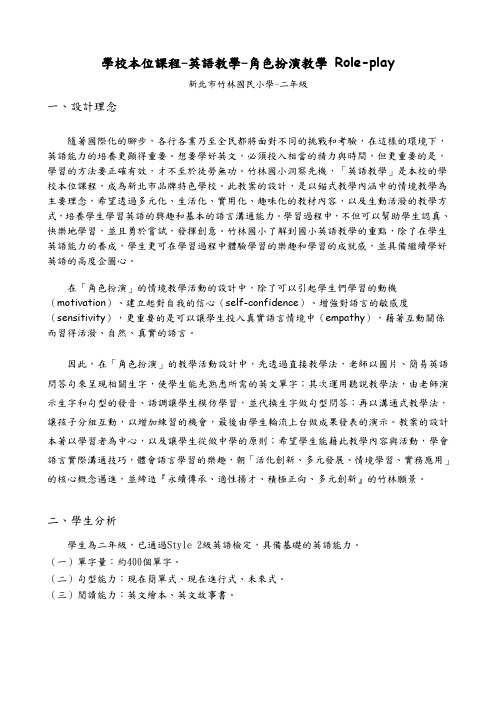
學校本位課程-英語教學-角色扮演教學Role-play新北市竹林國民小學-二年級一、設計理念隨著國際化的腳步,各行各業乃至全民都將面對不同的挑戰和考驗,在這樣的環境下,英語能力的培養更顯得重要。
想要學好英文,必須投入相當的精力與時間,但更重要的是,學習的方法要正確有效,才不至於徒勞無功。
竹林國小洞察先機,「英語教學」是本校的學校本位課程,成為新北市品牌特色學校。
此教案的設計,是以錨式教學內涵中的情境教學為主要理念,希望透過多元化、生活化、實用化、趣味化的教材內容,以及生動活潑的教學方式,培養學生學習英語的興趣和基本的語言溝通能力。
學習過程中,不但可以幫助學生認真、快樂地學習,並且勇於嘗試,發揮創意。
竹林國小了解到國小英語教學的重點,除了在學生英語能力的養成,學生更可在學習過程中體驗學習的樂趣和學習的成就感,並具備繼續學好英語的高度企圖心。
在「角色扮演」的情境教學活動的設計中,除了可以引起學生們學習的動機(motivation)、建立起對自我的信心(self-confidence)、增強對語言的敏感度(sensitivity),更重要的是可以讓學生投入真實語言情境中(empathy),藉著互動關係而習得活潑、自然、真實的語言。
因此,在「角色扮演」的教學活動設計中,先透過直接教學法,老師以圖片、簡易英語問答句來呈現相關生字,使學生能先熟悉所需的英文單字;其次運用聽說教學法,由老師演示生字和句型的發音、語調讓學生模仿學習,並代換生字做句型問答;再以溝通式教學法,讓孩子分組互動,以增加練習的機會,最後由學生輪流上台做成果發表的演示。
教案的設計本著以學習者為中心,以及讓學生從做中學的原則;希望學生能藉此教學內容與活動,學會語言實際溝通技巧,體會語言學習的樂趣,朝「活化創新、多元發展、情境學習、實務應用」的核心概念邁進,並締造『永續傳承、適性揚才、積極正向、多元創新』的竹林願景。
二、學生分析學生為二年級,已通過Style 2級英語檢定,具備基礎的英語能力。
人教版小学英语五年级上册Unit 3 A Let’s learn Role-play教案
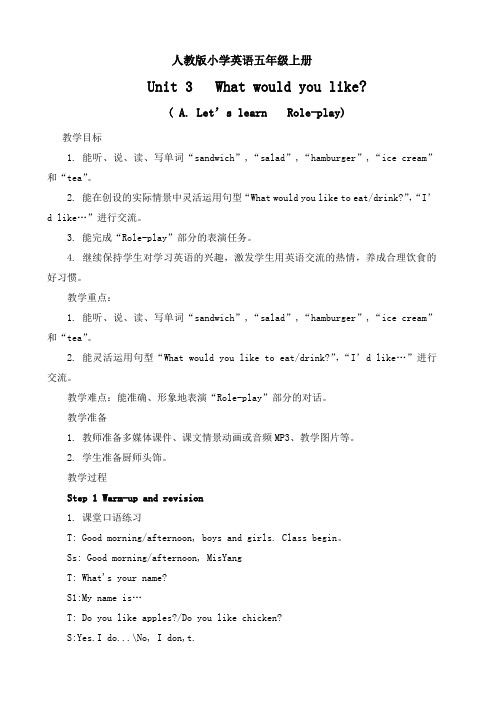
人教版小学英语五年级上册Unit 3 What would you like?( A. Let’s learn Role-play)教学目标1. 能听、说、读、写单词“sandwich”,“salad”,“hamburger”,“ice cream”和“tea”。
2. 能在创设的实际情景中灵活运用句型“What would you like to eat/drink?”,“I’d like…”进行交流。
3. 能完成“Role-play”部分的表演任务。
4. 继续保持学生对学习英语的兴趣,激发学生用英语交流的热情,养成合理饮食的好习惯。
教学重点:1. 能听、说、读、写单词“sandwich”,“salad”,“hamburger”,“ice cream”和“tea”。
2. 能灵活运用句型“What would you like to eat/drink?”,“I’d like…”进行交流。
教学难点:能准确、形象地表演“Role-play”部分的对话。
教学准备1. 教师准备多媒体课件、课文情景动画或音频MP3、教学图片等。
2. 学生准备厨师头饰。
教学过程Step 1 Warm-up and revision1. 课堂口语练习T: Good morning/afternoon, boys and girls. Class begin。
Ss: Good morning/afternoon, MisYangT: What's your name?S1:My name i s…T: Do you like apples?/Do you like chicken?S:Yes.I do...\No, I don,t.2. 教师用多媒体课件出示视频,一起听一首关于食物的歌,复习已经学过的食物来引出课题。
3.呈现歌曲中听到的菜品,问学生认识它们么,并用英语回答出来。
T: Do you know them?SI: Yes, potatoes.S2: fishS3: noodlesT:You can answer like this: "I’dlike potatoes".Ss repeatT: What would you like to eat?S2: I'd like… please设计意图学生通过复习旧知识自然引出课题,下面的教学自然就水到渠成。
典型教案roleplay
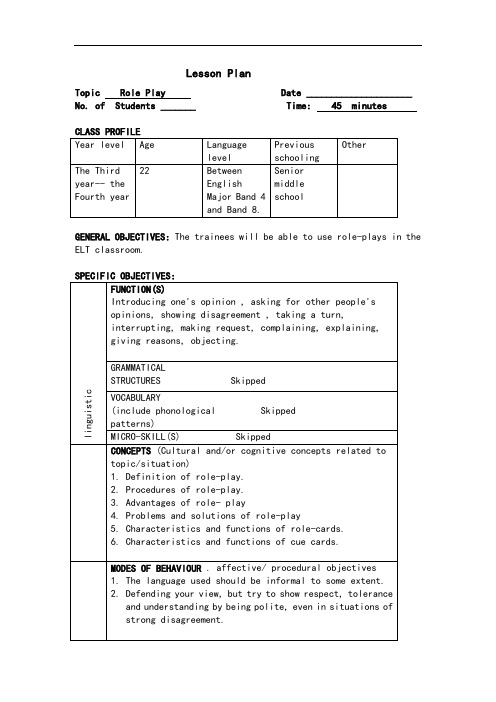
Lesson PlanTopic Role Play Date _____________________ No. of Students _______ Time: 45 minutesGENERAL OBJECTIVES: The trainees will be able to use role-plays in the ELT classroom.RATIONALE . why select these linguistic/conceptual objectives) LINGUISTIC:Role-play is an active phase of learning, so it involves a number of language functions. Students should pay attention to use right language form to express those functions.CONCEPTUAL/CULTURAL:The conversation goes on in a break, so the language used should be informal to some extent. Since the conversation takes place in a staffroom between colleagues, the speakers should keep polite manner.ASSUMED KNOWLEDGE . what do you assume learners know/can do ) LINGUISTIC:All trainees are familiar with the vocabulary and grammatical rules related to the topic, so it is unnecessary to present those language elements.CONCEPTUAL/CULTURAL:Most of the trainees have the experiences of role-play, but they are not theoretically clear about the definition, procedures, advantages, problems and solutions of role-plays. It is difficult for them to show respect, tolerance by being polite in situations of strong disagreement.AIDS: Overhead projector, computer, lesson plan in PPT.PROCEDUREPre-task activitiesactivity (1minut )of four groups (each member in a group getting the samerole-card)( 2minuts )the situation of the main task.(3minutes)Situation: You are four teachers meeting in the staffroom. You are very different with regard to your age, character and teaching experience. Try to speak to your colleagues in this role play as you would speak to colleagues in the staffroom, who are not necessarily your friends, whose viewpoints you might not agree with. Keep to polite language and social conventions.4. Helping students deal with necessary vocabulary, functions and register.( 2minutes)5. Carrying on group work to prepare arguments for this role together. ( 10minutes)Do not look at the other groups' role cards. Try to feel for your character, even if she/he is someone you probably wouldn't particularly like.While-task activities1. Second grouping. (1minut )Groups of four (each person having a different role now)2. Role-playing. (15 minutes)Post-task activitiesthe loop input of role play, mapping the content and the procedure in pairs. (4 minutes)2. Discussing on the aspects of role play. (4 minutes)3. Feedback and delayed error correction of language aspects. (3 minutes)ANTICIPATED PROBLEMS AND SOLUTIONSProblem :They create chaos in the classroomSolution: Careful consideration of classroom management necessary, the students have to be prepared gradually for this less formal type of of classroom activity (pair work first, short role plays first)Problem :They are inhibiting: some student are too shy to actSolution:They don't have to perform, just play a part; emphasis on 'play' rather than 'role'; careful preparationProblem : The students don't know what to saySolution:They need help with ideas and language: warm-ups, preparation, role-cards; they have to be prepared for the concept of their roles graduallyProblem : The students don't really learn anythingSolution: Analysis and evaluation of the language used is necessary. Practice of language they know in a free and uncontrolled way is important. Role-play = active phase of learning.Problem :The students find it difficult to pretend to be someone else.Solution: Careful preparation; student-generated role cards.Problem : They are too unpredictable.Solution: Tell students that unpredictability is present in daily life. Role plays can help to avoid the shock of language students in real life situations.Problem : they take too much time to prepareSolution: the teacher can take many ideas in coursebooks, in resources books; in student-generated role- plays. Preparation itself can be language practice already.Problem : The teacher cannot hear everyoneSolution:The students are distracted in full class form, too; the teacher cannot correct more than one student in full class form either; delayed correction as one possibility.MATERIALS:Role cardsRole card 1You are a teacher. You have been teaching at your school for about 20 years now. You are used to traditional teaching methods, and you have never tried role-plays in your classes.You had a tiring morning; the students in some of your classes were particularly undisciplined today. You meet three colleagues in the staffroom. You have, unusually, time to talk. These colleagues are not your friends, but you respect them as being good teachers.One of these colleagues starts a discussion on using role-plays in class. You want to convince the others that role-plays are not useful in class. You might admit one or two positive aspects that role-plays could have in the learning process, but generally you are strongly opposed to all'these new teaching methods' that take a lot of energy and preparation time.Role card 2You are a trainee teacher and an absolute beginner in the field of teaching English. You are anxious to cope with the amount of coursebook units and not to lose control over your students.You had a stressful time this morning, because one of your teacher trainers observed your lesson. You meet three colleagues in the staffroom. You have, unusually, time to talk. These colleagues are not your friends, but you respect them as being good teachers.One of these colleagues starts a discussion on using role-plays in class. You support one teacher's view that role-plays are not useful in class. Not long ago your teacher trainer asked you to try a role-play with one of your classes, which, however, turned out to be a disaster. You suddenly remember all the negative aspects and you cannot imagine ever using role-plays in your classes again; you much rather stick to other exercises the coursebook offers to you.Role card 3You are a teacher. You have been teaching English for a short time only, and you like trying new ideas.You have just used a role-play in one of your classes and feel it was very successful. You meet three colleagues in the staffroom. You have, unusually, time to talk. These colleagues are not your friends, but you respect them as being good teachers.You start a discussion on using role-plays in class telling your colleagues about the role-play you have just asked your students to do. You want to convince the others that role-plays are very useful in class. While admitting one or two problems that role-plays can bring about you are absolutely convinced that students learn a lot that way and you feel very confident and enthusiastic because of the experience you have just made.Role card 4You are a teacher. You have been teaching English for a couple of years already. You have just come back with lots of enthusiasm from two exciting weeks of teacher training in England.You had an interesting morning, because you tried some new ideas from the teacher training course. You meet three colleagues in the staffroom. You have, unusually, time to talk. These colleagues are not your friends, but you respect them as being good teachers.One of these colleagues starts a discussion on using role-plays in class. With missionary zeal you want to convince the others to usestudent-oriented speaking exercises on fluency such as role-plays much more often.Definition of role-playRole-play is an activity in which students imagine a role and have unscripted dialogues or discussion in a given situation..Advantages of the role-playIt is a rehearsal for real life situations in a friendly and safe environmentwith a wide variety of experience and situations brought into the classroom.Students explore language as it works in the real worldLanguage used is unpredictable as in daily life., no longer limited to the kind of language used by learners in the classroom.Acting out a situation encourages the students to use natural expressions and intonations as well as gestures.It is a kind of teaching of social skills.It increases motivation.It develops creativity.It promotes interaction.It encourages peer learning.'learning by doing' is an extremely effective way of learningSome students are liberatedStudents might find it easier to express themselves behind the mask of being someone else, communicate more freely if they have a role to hide behind. They no longer feel that their own personality is implicatedCharacteristics and functions of role-cardsGiving necessary background information: situation/context; persons: name, age, job/social status ,personality, feelings/aims/beliefs .Explaining the relationship to other people involved in the role-playGiving objectives, indicating possible behavior and actionsEncouraging spontaneous interaction by 'information-gaps'Helping with language: vocabulary, functions and register.Students' cognitive, linguistic and emotional preparation for free role playsCharacteristics and functions of cue-cardsNaming of situation and people involvedGiving explicit instruction to what should be said about content and language.Encouraging spontaneous interaction by 'information-gaps'Considering different levels and linguistic skills.Offering visual clues and verbal clues.Offering a variety of suggested answers to choose from.Allowing students' own phrasingIntroducing different registersIntroducing different functionReduction of errorsDirected practice of specific speaking skillsBuilding confidence in using the English languageIntroducing students to free discourseIntroducing students to pair/group work and student-oriented learningPossibility of varying level of difficultyRole cards 1-4:Since you have this talk in a break, the language you use can be informal to some extent. Defend your view, but try to show respect, tolerance and understanding by being polite, even in situations of strong disagreement.Here are some language functions you can use: Introducing one's opinion , asking for other people's opinions, showing disagreement , taking a turn, interrupting, making request, complaining, explaining, giving reasons, objecting.CRITERIA FOR EVALUATION. how will you decide objectives have been met)trainees can complete the role-play successfully.2 The trainees can map the content and the procedure in pairs and realize the advantage of the loop-input.3. The trainees can summarize the aspects of role play.4. The trainees are able to use informal language and speak in a polite manner.ACTUAL EVALUATION. to what extent were objectives met/what could you have done to improve effectiveness of lesson)The trainees have completed the role-play successfully, mapped the content and the procedure in pairs and realized the advantage of the loop-input. They can use informal language and speak in a polite manner. But they feel difficult to retell all aspects of the role play. The time for post-task activities should be longer. a polite manner.。
人教PEP版英语五年级上册Unit 3教案第2课时
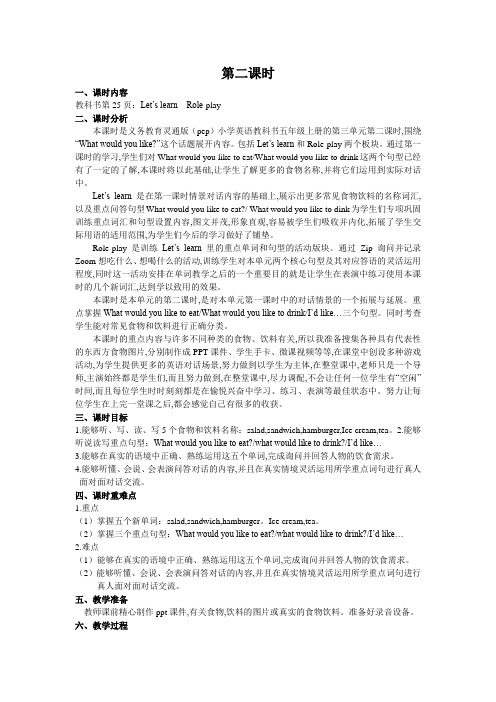
第二课时一、课时内容教科书第25页:Let’s learn Role-play二、课时分析本课时是义务教育灵通版(pep)小学英语教科书五年级上册的第三单元第二课时,围绕“What would you like?”这个话题展开内容。
包括Let’s learn和Role-play两个板块。
通过第一课时的学习,学生们对What would you like to eat/What would you like to drink这两个句型已经有了一定的了解,本课时将以此基础,让学生了解更多的食物名称,并将它们运用到实际对话中。
Let’s learn是在第一课时情景对话内容的基础上,展示出更多常见食物饮料的名称词汇,以及重点问答句型What would you like to eat?/ What would you like to dink为学生们专项巩固训练重点词汇和句型设置内容,图文并茂,形象直观,容易被学生们吸收并内化,拓展了学生交际用语的适用范围,为学生们今后的学习做好了铺垫。
Role-play是训练Let’s learn里的重点单词和句型的活动版块。
通过Zip 询问并记录Zoom想吃什么、想喝什么的活动,训练学生对本单元两个核心句型及其对应答语的灵活运用程度,同时这一活动安排在单词教学之后的一个重要目的就是让学生在表演中练习使用本课时的几个新词汇,达到学以致用的效果。
本课时是本单元的第二课时,是对本单元第一课时中的对话情景的一个拓展与延展。
重点掌握What would you like to eat/What would you like to drink/I’d like…三个句型。
同时考查学生能对常见食物和饮料进行正确分类。
本课时的重点内容与许多不同种类的食物、饮料有关,所以我准备搜集各种具有代表性的东西方食物图片,分别制作成PPT课件、学生手卡、微课视频等等,在课堂中创设多种游戏活动,为学生提供更多的英语对话场景,努力做到以学生为主体,在整堂课中,老师只是一个导师,主演始终都是学生们,而且努力做到,在整堂课中,尽力调配,不会让任何一位学生有“空闲”时间,而且每位学生时时刻刻都是在愉悦兴奋中学习、练习、表演等最佳状态中。
五年级英语上册Unit3课时2Let'slearn_Role_play教案人教PEP(含教学反思)
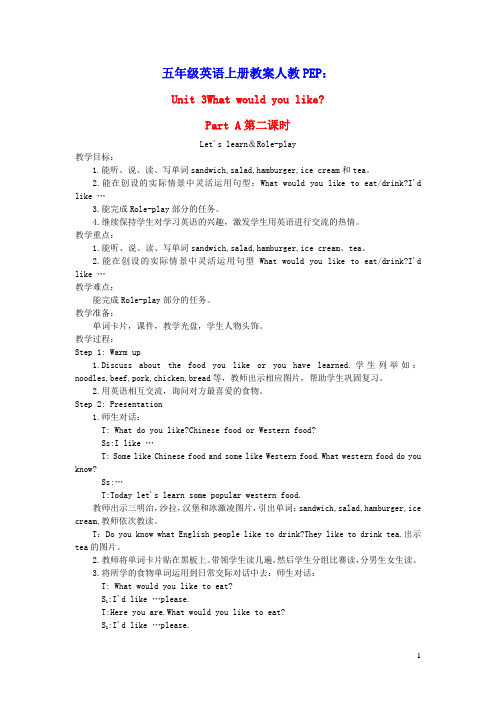
五年级英语上册教案人教PEP:Unit 3What would you like?Part A第二课时Let's learn&Role-play教学目标:1.能听、说、读、写单词sandwich,salad,hamburger,ice cream和tea。
2.能在创设的实际情景中灵活运用句型:What would you like to eat/drink?I'd like …3.能完成Role-play部分的任务。
4.继续保持学生对学习英语的兴趣,激发学生用英语进行交流的热情。
教学重点:1.能听、说、读、写单词sandwich,salad,hamburger,ice cream、tea。
2.能在创设的实际情景中灵活运用句型What would you like to eat/drink?I'd like …教学难点:能完成Role-play部分的任务。
教学准备:单词卡片,课件,教学光盘,学生人物头饰。
教学过程:Step 1: Warm up1.Discuss about the food you like or you have learned.学生列举如:noodles,beef,pork,chicken,bread等,教师出示相应图片,帮助学生巩固复习。
2.用英语相互交流,询问对方最喜爱的食物。
Step 2: Presentation1.师生对话:T: What do you like?Chinese food or Western food?Ss:I like …T: Some like Chinese food and some like Western food.What western food do you know?Ss:…T:Today let's learn some popular western food.教师出示三明治,沙拉,汉堡和冰激凌图片,引出单词:sandwich,salad,hamburger,ice cream,教师依次教读。
外研英语六年级上优质教案:Module5 Unit 2 I can speak French 教案
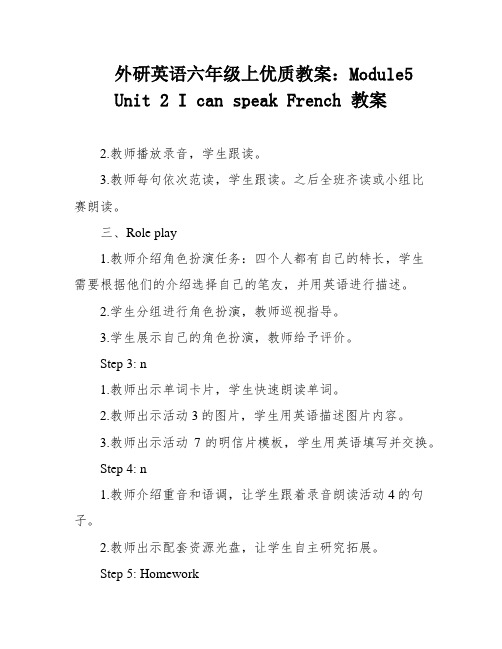
外研英语六年级上优质教案:Module5Unit 2 I can speak French 教案2.教师播放录音,学生跟读。
3.教师每句依次范读,学生跟读。
之后全班齐读或小组比赛朗读。
三、Role play1.教师介绍角色扮演任务:四个人都有自己的特长,学生需要根据他们的介绍选择自己的笔友,并用英语进行描述。
2.学生分组进行角色扮演,教师巡视指导。
3.学生展示自己的角色扮演,教师给予评价。
Step 3: n1.教师出示单词卡片,学生快速朗读单词。
2.教师出示活动3的图片,学生用英语描述图片内容。
3.教师出示活动7的明信片模板,学生用英语填写并交换。
Step 4: n1.教师介绍重音和语调,让学生跟着录音朗读活动4的句子。
2.教师出示配套资源光盘,让学生自主研究拓展。
Step 5: Homework1.完成配套资源光盘上的练。
2.准备下节课的自我介绍。
In this lesson。
students will learn about pen pals and how to XXX will present Mike's postcard and introduce him in English。
Mike is 11 years old and from Sydney。
XXX。
reading。
swimming。
and singing songs。
The same method will be used to introduce Tingting。
Jim。
and Linda.The lesson will focus on the use of "can" and "like" in sentences。
"Can" is a modal verb that does not change with the subject and is followed by the base form of the verb。
典型教案设计role play
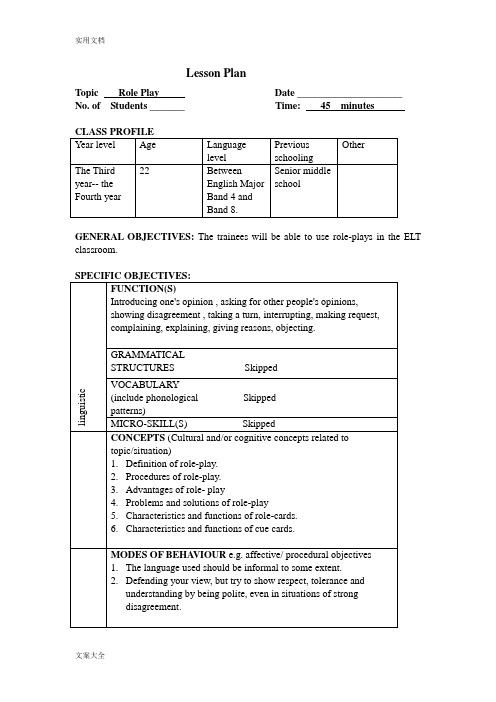
Lesson PlanTopic Role Play Date _____________________ No. of Students _______ Time: 45 minutesGENERAL OBJECTIVES:The trainees will be able to use role-plays in the ELT classroom.RATIONALE (i.e. why select these linguistic/conceptual objectives?) LINGUISTIC:Role-play is an active phase of learning, so it involves a number of language functions. Students should pay attention to use right language form to express those functions.CONCEPTUAL/CULTURAL:The conversation goes on in a break, so the language used should be informal to some extent. Since the conversation takes place in a staffroom between colleagues, the speakers should keep polite manner.ASSUMED KNOWLEDGE (i.e. what do you assume learners know/can do ?) LINGUISTIC:All trainees are familiar with the vocabulary and grammatical rules related to the topic, so it is unnecessary to present those language elements.CONCEPTUAL/CULTURAL:Most of the trainees have the experiences of role-play, but they are not theoretically clear about the definition, procedures, advantages, problems and solutions ofrole-plays. It is difficult for them to show respect, tolerance by being polite in situations of strong disagreement.AIDS: Overhead projector, computer, lesson plan in PPT.PROCEDUREPre-task activities1.Warming-up activity (1minut )2.Forming of four groups (each member in a group getting the samerole-card)( 2minuts )3.Explaining the situation of the main task.(3minutes)Situation: You are four teachers meeting in the staffroom. You are very different with regard to your age, character and teaching experience.Try to speak to your colleagues in this role play as you would speak to colleagues in the staffroom, who are not necessarily your friends, whose viewpoints you might not agree with. Keep to polite language and social conventions.4. Helping students deal with necessary vocabulary, functions and register.( 2minutes)5. Carrying on group work to prepare arguments for this role together. ( 10minutes) Do not look at the other groups' role cards. Try to feel for your character, even ifshe/he is someone you probably wouldn't particularly like.While-task activities1. Second grouping. (1minut )Groups of four (each person having a different role now)2. Role-playing. (15 minutes)Post-task activities1.Evaluating the loop input of role play, mapping the content and the procedure in pairs. (4 minutes)2. Discussing on the aspects of role play. (4 minutes)3. Feedback and delayed error correction of language aspects. (3 minutes) ANTICIPATED PROBLEMS AND SOLUTIONSProblem :They create chaos in the classroomSolution: Careful consideration of classroom management necessary, the students have to be prepared gradually for this less formal type of of classroom activity (pair work first, short role plays first)Problem :They are inhibiting: some student are too shy to actSolution: They don't have to perform, just play a part; emphasis on 'play' rather than 'role'; careful preparationProblem : The students don't know what to saySolution: They need help with ideas and language: warm-ups, preparation, role-cards; they have to be prepared for the concept of their roles graduallyProblem : The students don't really learn anythingSolution: Analysis and evaluation of the language used is necessary. Practice of language they know in a free and uncontrolled way is important. Role-play = active phase of learning.Problem :The students find it difficult to pretend to be someone else.Solution: Careful preparation; student-generated role cards.Problem : They are too unpredictable.Solution: Tell students that unpredictability is present in daily life. Role plays can help to avoid the shock of language students in real life situations.Problem : they take too much time to prepareSolution: the teacher can take many ideas in coursebooks, in resources books; in student-generated role- plays. Preparation itself can be language practice already.Problem : The teacher cannot hear everyoneSolution:The students are distracted in full class form, too; the teacher cannot correct more than one student in full class form either; delayed correction as one possibility.MATERIALS:Role cardsRole card 1You are a teacher. You have been teaching at your school for about 20 years now. You are used to traditional teaching methods, and you have never tried role-plays in your classes.You had a tiring morning; the students in some of your classes were particularly undisciplined today. You meet three colleagues in the staffroom. You have, unusually, time to talk. These colleagues are not your friends, but you respect them as being good teachers.One of these colleagues starts a discussion on using role-plays in class. You want to convince the others that role-plays are not useful in class. You might admit one or two positive aspects that role-plays could have in the learning process, but generally you are strongly opposed to all 'these new teaching methods' that take a lot of energy and preparation time.Role card 2You are a trainee teacher and an absolute beginner in the field of teaching English. You are anxious to cope with the amount of coursebook units and not to lose control over your students.You had a stressful time this morning, because one of your teacher trainers observed your lesson. You meet three colleagues in the staffroom. You have, unusually, time to talk. These colleagues are not your friends, but you respect them as being good teachers.One of these colleagues starts a discussion on using role-plays in class. You support one teacher's view that role-plays are not useful in class. Not long ago your teacher trainer asked you to try a role-play with one of your classes, which, however, turned out to be a disaster. You suddenly remember all the negative aspects and you cannot imagine ever using role-plays in your classes again; you much rather stick to other exercises the coursebook offers to you.Role card 3You are a teacher. You have been teaching English for a short time only, and you like trying new ideas.You have just used a role-play in one of your classes and feel it was very successful. You meet three colleagues in the staffroom. You have, unusually, time to talk. These colleagues are not your friends, but you respect them as being good teachers.You start a discussion on using role-plays in class telling your colleagues about the role-play you have just asked your students to do. You want to convince the others that role-plays are very useful in class. While admitting one or two problems that role-plays can bring about you are absolutely convinced that students learn a lot that way and you feel very confident and enthusiastic because of the experience you have just made.Role card 4You are a teacher. You have been teaching English for a couple of years already. You have just come back with lots of enthusiasm from two exciting weeks of teacher training in England.You had an interesting morning, because you tried some new ideas from the teacher training course. You meet three colleagues in the staffroom. You have, unusually, time to talk. These colleagues are not your friends, but you respect them as being good teachers.One of these colleagues starts a discussion on using role-plays in class. With missionary zeal you want to convince the others to use student-oriented speaking exercises on fluency such as role-plays much more often.Definition of role-playRole-play is an activity in which students imagine a role and have unscripted dialogues or discussion in a given situation..Advantages of the role-playIt is a rehearsal for real life situations in a friendly and safe environmentwith a wide variety of experience and situations brought into the classroom. Students explore language as it works in the real worldLanguage used is unpredictable as in daily life., no longer limited to the kind of language used by learners in the classroom.Acting out a situation encourages the students to use natural expressions and intonations as well as gestures.It is a kind of teaching of social skills.It increases motivation.It develops creativity.It promotes interaction.It encourages peer learning.'learning by doing' is an extremely effective way of learningSome students are liberatedStudents might find it easier to express themselves behind the mask of being someone else, communicate more freely if they have a role to hide behind. They no longer feel that their own personality is implicatedCharacteristics and functions of role-cardsGiving necessary background information:situation/context; persons: name, age, job/social status ,personality, feelings/aims/beliefs .Explaining the relationship to other people involved in the role-playGiving objectives, indicating possible behavior and actionsEncouraging spontaneous interaction by 'information-gaps'Helping with language: vocabulary, functions and register.Students' cognitive, linguistic and emotional preparation for free role plays Characteristics and functions of cue-cardsNaming of situation and people involvedGiving explicit instruction to what should be said about content and language. Encouraging spontaneous interaction by 'information-gaps'Considering different levels and linguistic skills.Offering visual clues and verbal clues.Offering a variety of suggested answers to choose from.Allowing students' own phrasingIntroducing different registersIntroducing different functionReduction of errorsDirected practice of specific speaking skillsBuilding confidence in using the English languageIntroducing students to free discourseIntroducing students to pair/group work and student-oriented learningPossibility of varying level of difficultyRole cards 1-4:Since you have this talk in a break, the language you use can be informal to some extent. Defend your view, but try to show respect, tolerance and understanding by being polite, even in situations of strong disagreement.Here are some language functions you can use: Introducing one's opinion , asking for other people's opinions, showing disagreement , taking a turn, interrupting, making request, complaining, explaining, giving reasons, objecting.CRITERIA FOR EV ALUATION(i.e. how will you decide objectives have been met?)1.The trainees can complete the role-play successfully.2 The trainees can map the content and the procedure in pairs and realize the advantage of the loop-input.3. The trainees can summarize the aspects of role play.4. The trainees are able to use informal language and speak in a polite manner.ACTUAL EV ALUATION(i.e. to what extent were objectives met/what could you have done to improve effectiveness of lesson?)The trainees have completed the role-play successfully, mapped the content and the procedure in pairs and realized the advantage of the loop-input. They can use informal language and speak in a polite manner. But they feel difficult to retell all aspects of the role play. The time for post-task activities should be longer. a polite manner.。
- 1、下载文档前请自行甄别文档内容的完整性,平台不提供额外的编辑、内容补充、找答案等附加服务。
- 2、"仅部分预览"的文档,不可在线预览部分如存在完整性等问题,可反馈申请退款(可完整预览的文档不适用该条件!)。
- 3、如文档侵犯您的权益,请联系客服反馈,我们会尽快为您处理(人工客服工作时间:9:00-18:30)。
Lesson Plan
Topic __new words and phrases____________________ Date _____________________ No. of Students _______ Time: _____45minutes______________ CLASS PROFILE ______
GENERAL OBJECTIVES: students will be able to read and remember the words.
RATIONALE (i.e. why select these linguistic/conceptual objectives?)
LINGUISTIC: vocabulary plays an important role in English learning. Commanding a large number of words is vital for primary school students.
CONCEPTUAL/CULTURAL: the conversation is between primary school students, so it should be concise and simple.
ASSUMED KNOWLEDGE (i.e. what do you assume learners know/can do ?) LINGUISTIC: All students would be able to remember the vast majority of the words. And they could also make a conversation.
CONCEPTUAL/CULTURAL: All the students may have a clear understanding of the new words but they may not use them in a correct way.
AIDS Overhead projector, computer, lesson plan in PPT.
PROCEDURE
STAGE/TIMING TEACHER ACTIVITY STUDENT ACTIVITY WHY
Step 1
Warning–up activity to arouse students’
interest in this topic dividing students into group To make the conversation
smooth
playing the record for two to three times reading after the record to help impress
the students reading the words once again
Step 2
Correcting the students’ pronunciation to develop their
fluency of oral
English; to
know how to
put passive
words into
active use Step 3
Improving their fluency organizing the conversation and
Giving the presentation
Commenting on the students’ presentation
And giving advice to betterment to improve
their
language
skills
BLACKBOARD
ORGANISATION
Words with pictures Chinese meaning examples
FOLLOW UP/EXTENSION
1.invite one student to comment on other group’s performance. If possible, they can
perform what they have practiced.
2.
_ANTICIPATED PROBLEMS
POTENTIAL PROBLEM COUNTER-STRATEGY
(linguistic/ cultural/behavioral)
Cannot pronounce correctly
Being too shy and timid to perform encourage them to perform even for 40
seconds
CRITERIA FOR EV ALUATION
(i.e. how will you decide objectives have been met?)
1. the students are able to pronounce the words
2. the presentation goes on well
3. other students could say something about the presentation
4. _____________________________________________________________________________
ACTUAL EV ALUATION
(i.e. to what extent were objectives met/
what could you have done to improve effectiveness of lesson?)
1 The students can finish the performance successfully.
2 The students can remember a large part of the words.
Detailed Lesson Plan
Step 1
T: introduce the topic to the students and talk something interesting to arouse their
interest
S1: give his or her own thought about the tipoc
T: put on the MP3, ask students to read after it for several times
S2: try to read the words aloud and recite them
Step 2
T: according to the student’s command of the new words, ask students to perform
S3: give their performance
T: welcome other students to evaluate
Ss: give his or her comments
Step 3
T: point out the good aspect of the performance
S3: try to act under the guidance given by the teachers
T: put on a video and give special directions to the students
Ss:
Step 4
T : invite another group to perform
S students perform
T based on the former performances, try to make comparisons
S talk about anything related to what they have learned today
Ps.
Cognitive strategy: I categorize words according to parts of speech. Metacognitive strategy: I think that categorizing words according to parts of speech helps to memorize words.
Cognitive strategy: I pay special attention to topic sentences while reading.
Metacognitive strategy: I think that paying special attention to topic sentences while reading helps to get general idea of a text.。
